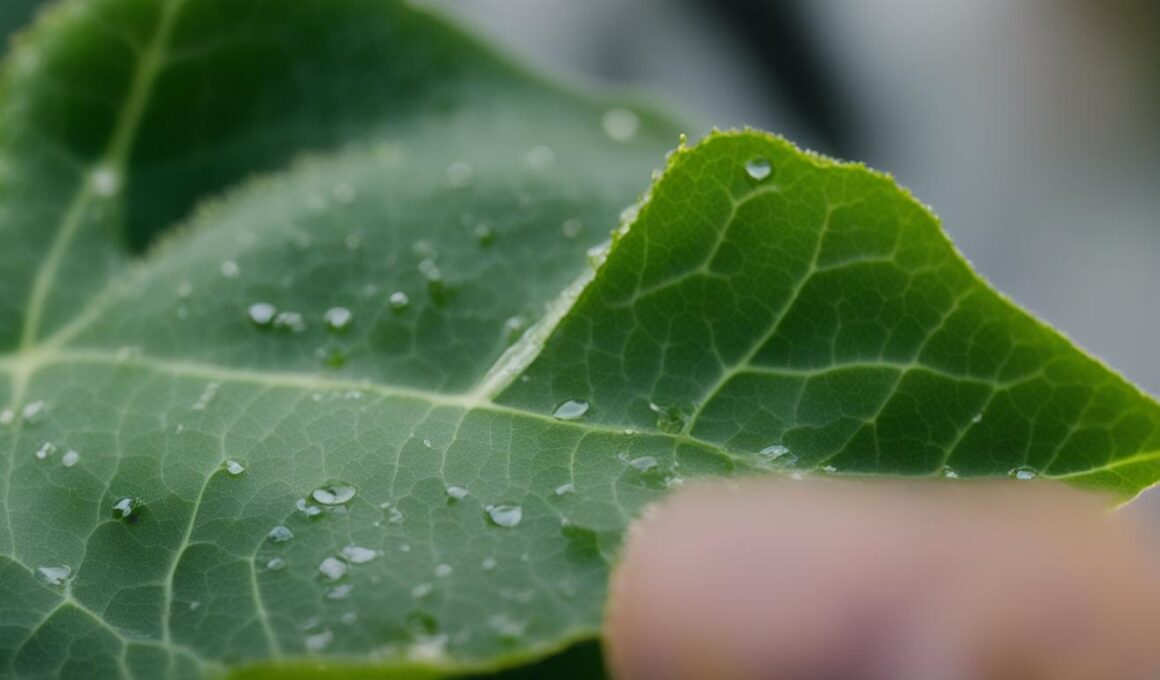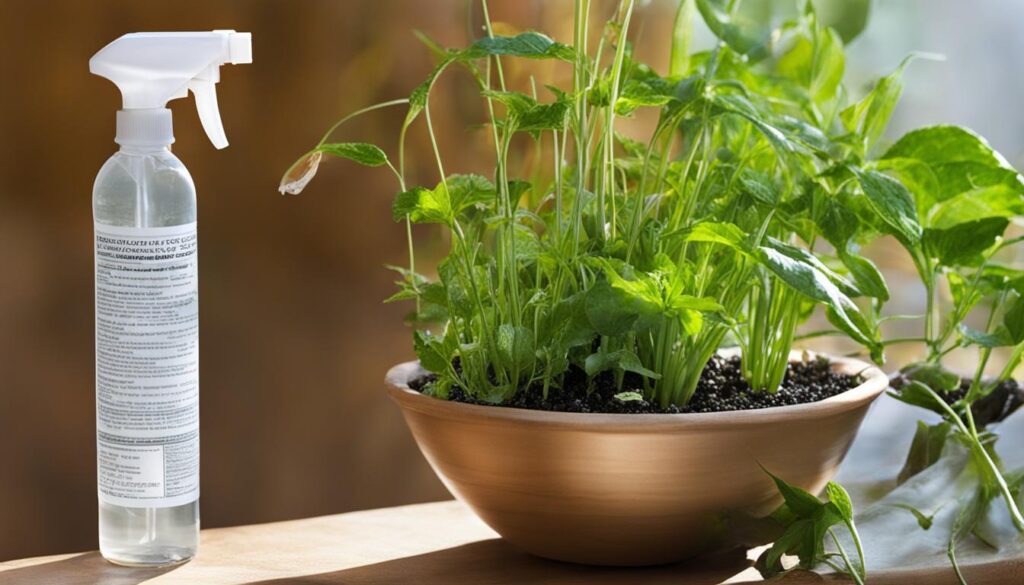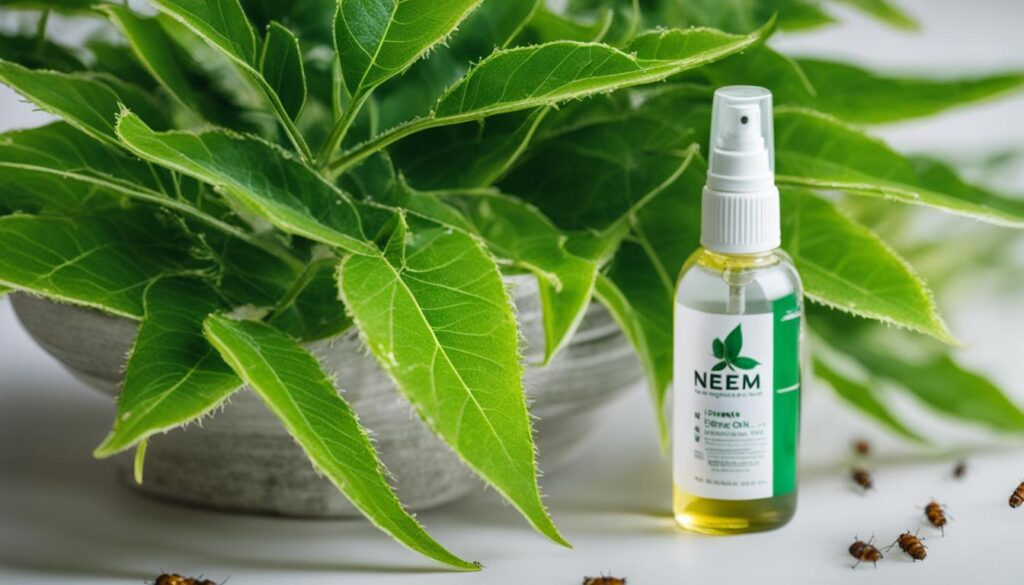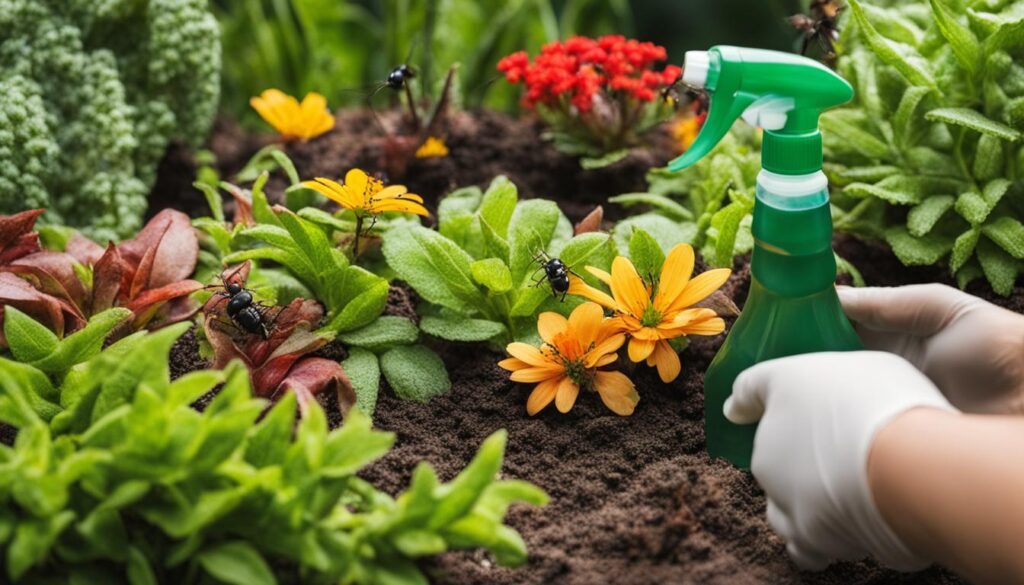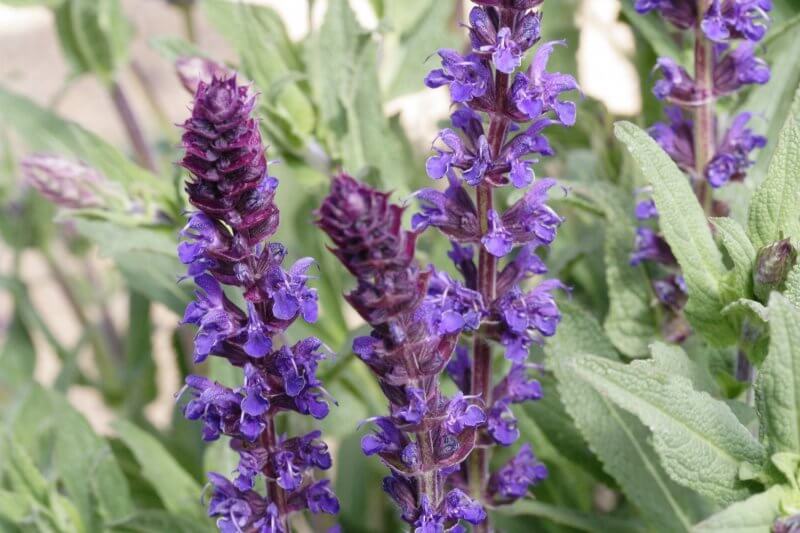Are pesky bugs wreaking havoc on your precious plants? Don’t worry, we’ve got you covered with effective solutions that will protect your greenery without harming the environment. Say goodbye to toxic chemicals and embrace natural methods that are safe for you, your plants, and the ecosystem.
Homemade insect sprays and deterrents are not only eco-friendly but also highly effective in controlling plant bugs. By using simple ingredients found in your kitchen, you can create bug sprays that will keep pests at bay and ensure the health of your plants.
Key Takeaways:
- Homemade bug sprays are a safe and eco-friendly alternative to toxic chemicals.
- Companion planting and plant diversity can help create a healthy ecosystem that reduces the need for bug sprays.
- Insecticidal soap, neem oil bug spray, vinegar spray, garlic spray, and tomato leaf spray are effective options for controlling various pests.
- Proper application and regular reapplication are essential for the effectiveness of homemade bug sprays.
- Patch-test any homemade bug sprays before applying to your plants and avoid spraying during the heat of the day.
Homemade Insecticidal Soap: An Effective Bug Spray
When it comes to dealing with garden pests like aphids, lacebugs, leafhoppers, mealybugs, and thrips, homemade insecticidal soap is a powerful and effective solution. Made by combining vegetable oil with dishwashing or pure Castile liquid soap, this bug spray can help protect your plants without the need for toxic chemicals. By diluting the mixture with warm water in a spray bottle and applying it to your plants, you can target and control a wide range of pests.
It’s important to note that insecticidal soap is best used as a short-term solution and should be reapplied every few days for optimal results. The soap works by suffocating and dehydrating the pests, effectively eliminating them from your plants. This natural and eco-friendly bug spray can be a great alternative to commercial pesticides, especially if you’re looking to minimize your environmental impact.
When using homemade insecticidal soap, it’s essential to follow the instructions carefully and avoid spraying during the heat of the day, as this can potentially harm your plants. Additionally, it’s recommended to patch-test any homemade bug sprays on a small area of your plants before applying them extensively. This helps ensure that your plants won’t have any adverse reactions to the soap. With proper usage, homemade insecticidal soap can become a valuable tool in your gardening arsenal, providing an effective way to protect your plants.
Homemade Insecticidal Soap Recipe
- Mix 1 tablespoon of vegetable oil with 1 tablespoon of dishwashing or pure Castile liquid soap.
- Add the soap-oil mixture to a spray bottle and fill it with warm water.
- Shake the bottle gently to combine the ingredients.
- Test the spray on a small area of your plants and wait 24 hours to check for any negative reactions.
- If there are no adverse effects, you can proceed to apply the homemade insecticidal soap to your plants, making sure to thoroughly coat the affected areas.
- Reapply every few days or as needed to maintain pest control.
| Pests | Effectiveness |
|---|---|
| Aphids | High |
| Lacebugs | High |
| Leafhoppers | Medium |
| Mealybugs | Medium |
| Thrips | Medium |
Neem Oil Bug Spray: An Organic Solution
When it comes to a natural and effective bug spray, neem oil is a go-to choice for many gardeners. This organic insecticide has been used for thousands of years in India and is known for its ability to control a wide range of garden pests. From mites and whitefly to aphids, thrips, and mealybugs, neem oil is effective against pests at every stage of their life cycle. It can also help control powdery mildew, a common fungal disease that affects many plants.
To create a neem oil bug spray, mix pure, cold-pressed neem oil with water and a small amount of dish soap. The dish soap helps emulsify the oil and ensure it spreads evenly on your plants. Once you have your mixture ready, transfer it to a spray bottle for easy application. When using neem oil, it’s important to follow the instructions on the label and avoid applying it during the hottest parts of the day to prevent leaf burn.
One of the major advantages of neem oil is its organic nature. It is safe for birds, pets, and beneficial insects, making it an eco-friendly choice for pest control. Unlike chemical insecticides, neem oil breaks down quickly in the environment, minimizing its impact on the ecosystem. It also offers a sustainable alternative to synthetic products, allowing you to protect your plants while minimizing harm to the environment.
Benefits of Neem Oil Bug Spray:
- Effective against a wide range of garden pests, including mites, whitefly, aphids, thrips, and mealybugs.
- Controls pests at every stage of their life cycle.
- Helps control powdery mildew.
- Safe for birds, pets, and beneficial insects.
- Environmentally friendly and sustainable.
How to use Neem Oil Bug Spray:
- Mix pure, cold-pressed neem oil with water and a small amount of dish soap.
- Transfer the mixture to a spray bottle.
- Apply the neem oil bug spray to your plants, making sure to cover all surfaces.
- Reapply every 7-14 days or as needed, following the instructions on the label.
With neem oil bug spray, you can protect your plants from pests while staying true to your eco-friendly gardening practices. Its organic nature and effectiveness against a variety of garden pests make it a valuable addition to any gardener’s toolkit.
Vinegar Spray: A Natural Bug Repellent
Vinegar is a versatile household product that can also be used as a natural bug spray to repel a wide range of garden pests. Whether you’re dealing with aphids, ants, or other pesky insects, vinegar spray can help keep them at bay without the need for harsh chemicals. The acetic acid in vinegar acts as an effective repellent and can treat aphids and other garden pests upon direct contact.
To create a vinegar spray, simply mix equal parts of white vinegar and water in a spray bottle. Add a small amount of dishwashing soap to the mixture and shake well. The soap helps the solution adhere to the plants and pests. It’s important to thoroughly spray the affected areas, including under the leaves, where many insects like to hide.
Vinegar spray not only repels bugs, but it can also deter ants and other scent-driven pests from invading your garden. The strong scent of vinegar interferes with their ability to detect food sources, making your plants less attractive to them. Regular applications of vinegar spray can help maintain a pest-free garden and protect your greenery.
Benefits of Vinegar Spray:
- Effective natural bug repellent for garden pests like aphids and ants
- Easy to make with common household ingredients
- Safe for plants, birds, pets, and beneficial insects
- Environmentally friendly alternative to toxic chemical insecticides
By using vinegar spray, you can take a proactive approach to pest control in your garden while keeping your plants healthy and protected. Remember to patch-test any homemade sprays on a small area of your plants before applying them more widely, as some plants may be sensitive to vinegar. Additionally, avoid spraying vinegar solution during the hottest parts of the day to prevent potential leaf burn.
Tips for Using Vinegar Spray:
- Mix equal parts of white vinegar and water for an effective spray solution
- Add a small amount of dishwashing soap to help the solution adhere to plants and pests
- Thoroughly spray the affected areas, including under the leaves, where insects hide
- Apply regularly to maintain a pest-free garden
- Test on a small area of plants before widespread use
- Avoid spraying during the hottest parts of the day to prevent leaf burn
What Makes an Insect Killer Plant Effective for Protecting Greenery?
The insect killer plant discovery has shed light on how certain species of plants can naturally protect greenery. These plants produce chemicals that attract, trap, and kill insects, effectively safeguarding the surrounding area. This natural defense mechanism makes insect killer plants an effective and eco-friendly solution for pest control.
Conclusion
Protecting your plants from bugs and pests doesn’t have to involve toxic chemicals. You can ensure the health and vitality of your greenery by using effective and eco-friendly solutions. Homemade bug sprays like insecticidal soap, neem oil bug spray, vinegar spray, garlic spray, and tomato leaf spray are all great options for controlling pests in your garden.
By utilizing companion planting and plant diversity, you can create a balanced garden ecosystem that reduces the need for bug sprays. This approach promotes natural pest control by attracting beneficial insects and repelling harmful pests. It’s an eco-friendly way to protect your plants and maintain a healthy garden.
Remember to patch-test any homemade bug sprays before applying them to your plants. This will ensure that they are safe and effective. Additionally, avoid spraying during the heat of the day to prevent damage to your plants. Safeguard your greenery today with these effective plant bug killer solutions and enjoy a thriving garden all year round.
FAQ
Can homemade insect sprays effectively control pests in my garden?
Yes, homemade insect sprays like insecticidal soap, neem oil bug spray, vinegar spray, garlic spray, and tomato leaf spray are all great options for controlling various pests in your garden.
What pests can homemade insecticidal soap treat?
Homemade insecticidal soap is effective against a wide range of pests including aphids, lacebugs, leafhoppers, mealybugs, and thrips.
Is neem oil safe for pets and beneficial insects?
Yes, neem oil is safe for birds, pets, and beneficial insects while still being effective against pests like mites, whitefly, aphids, thrips, and mealybugs.
What can vinegar spray repel in the garden?
Vinegar spray can repel a wide range of garden pests including aphids and other scent-driven pests like ants.
Are these homemade bug sprays eco-friendly?
Yes, homemade bug sprays are eco-friendly as they do not contain toxic chemicals, making them a safe and sustainable option for pest control in your garden.





